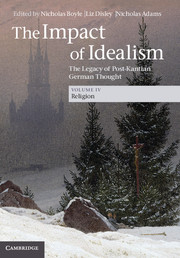Book contents
- Frontmatter
- Contents
- List of Contributors
- Acknowledgements
- List of Abbreviations
- Introduction: the impact of Idealism on religion
- 1 The impact of Idealism on Christology: from Hegel to Tillich
- 2 German Idealism's Trinitarian legacy: the nineteenth century
- 3 German Idealism's Trinitarian legacy: the twentieth century
- 4 Kierkegaard, Hegelianism and the theology of the paradox
- 5 Biblical hermeneutics: from Kant to Gadamer
- 6 Aesthetic Idealism and its relation to theological formation: reception and critique
- 7 The autonomy of theology and the impact of Idealism: from Hegel to radical orthodoxy
- 8 Faith and reason
- 9 Rabbinic Idealism and Kabbalistic realism: Jewish dimensions of Idealism and Idealist dimensions of Judaism
- 10 ‘In the arms of gods’: Schelling, Hegel and the problem of mythology
- 11 Dialectic and analogy: a theological legacy
- Bibliography
- Index
- References
7 - The autonomy of theology and the impact of Idealism: from Hegel to radical orthodoxy
Published online by Cambridge University Press: 05 December 2013
- Frontmatter
- Contents
- List of Contributors
- Acknowledgements
- List of Abbreviations
- Introduction: the impact of Idealism on religion
- 1 The impact of Idealism on Christology: from Hegel to Tillich
- 2 German Idealism's Trinitarian legacy: the nineteenth century
- 3 German Idealism's Trinitarian legacy: the twentieth century
- 4 Kierkegaard, Hegelianism and the theology of the paradox
- 5 Biblical hermeneutics: from Kant to Gadamer
- 6 Aesthetic Idealism and its relation to theological formation: reception and critique
- 7 The autonomy of theology and the impact of Idealism: from Hegel to radical orthodoxy
- 8 Faith and reason
- 9 Rabbinic Idealism and Kabbalistic realism: Jewish dimensions of Idealism and Idealist dimensions of Judaism
- 10 ‘In the arms of gods’: Schelling, Hegel and the problem of mythology
- 11 Dialectic and analogy: a theological legacy
- Bibliography
- Index
- References
Summary
In this essay, I want to argue two theses. First, that the theological element in the impact of German Idealism has to be understood as autonomous. That is to say, there is a theological strand in the impact of German Idealism that must be understood as independent of its cultural, historical and philosophical reception. Second, understanding that autonomy means understanding the context of the theological thought of German Idealism in the whole discourse of the culture in which it originated and of the successive cultural worlds in which it has been received.
First, I will argue that the key to the trajectory of philosophical theology in German Idealism, and its subsequent legacy, is the work of Hegel. Hegel's central doctrine is a radically new idea of Revelation: a doctrine of theology and philosophy as different but related modes of self-conscious Spirit. This idea entails not only the autonomy of theology but also – and for the same reasons – the autonomy of philosophy in relation to theology. This new idea of Revelation therefore implies a radical acknowledgement of the difference as well as the connection between the philosophical and theological modes of truth: it is the very opposite of the reduction of the life of faith to a secularised cultural narrative.
- Type
- Chapter
- Information
- The Impact of IdealismThe Legacy of Post-Kantian German Thought, pp. 167 - 193Publisher: Cambridge University PressPrint publication year: 2013



